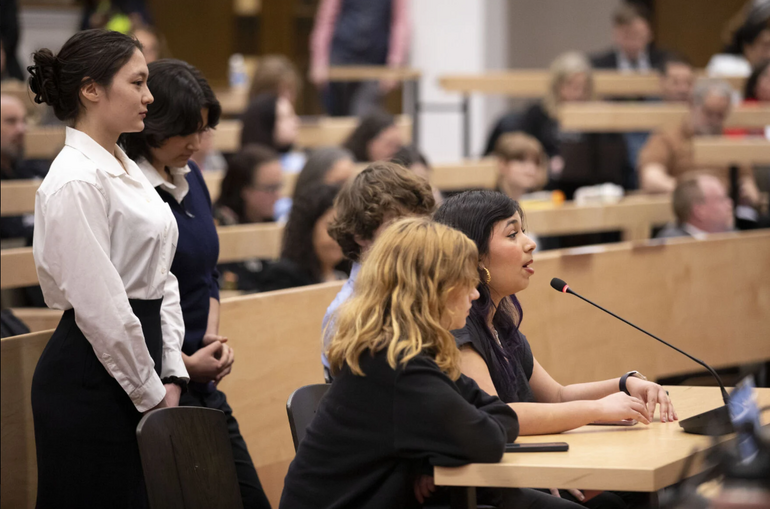Students warned lawmakers Tuesday of funding deficits and unpredictability, faculty layoffs and slashed electives at regional and rural schools, piling on to heightened calls to “crack open” the state’s Chapter 70 and rural aid funding formula.
Amherst Regional High School students flooded Gardner Auditorium for the Joint Committee on Ways and Means’ final budget hearing to share experiences that they tied to inadequate funding. Northampton Regional High School, Gateway Regional School District, Chester Elementary School and South Hadley students also arrived on Beacon Hill to add to the conversation.
“These are not the conditions in which youth can learn at a level that our state claims to provide,” Amelia Durbin, a junior at Northampton High, said about the elementary class sizes in Northampton that she said are hitting 30-to-40 children. “Funding education is not one-size-fits-all — your system is not working.”
The testimony from students follows recent calls by K-12 education advocates in Massachusetts for the state to rethink the structure of Chapter 70 funding, which they say is currently forcing smaller, regional and rural districts into budget shortfalls.
Students spoke about the nearly 20 full-time teaching positions removed in South Hadley; the potential for declining student mental health in the wake of guidance counselor cuts in Northampton; an inability to fund college placement classes at Gateway; school building maintenance falling to the wayside; and arts and humanities electives facing cuts in multiple western Massachusetts districts.
“Electives are a vital [part of the system] impacting thousands of students who rely on them to find their passions,” Northampton students told lawmakers. They named band, business and culinary arts programs as examples of classes facing cuts, and classroom aides, reading specialists and library staff as positions at-risk.
At Gateway, students lost access to a later bus meant to get them home after extracurriculars, which they say are already limited. “Gateway is in jeopardy — in jeopardy of losing our teachers, in jeopardy of losing our learning opportunities and ultimately, in jeopardy of shutting down,” eighth graders said. “We are starting to understand that there is inequality that exists between rural and suburban schools and urban schools.”
Chester Elementary fourth graders placed an emphasis on rural school aid in a letter they wrote to lawmakers. “Every year, we have to fight for rural school aid, meant to provide rural schools with the money they need to function [and] every year, this funding is in danger,” students read.
According to two students from South Hadley High, proposed budget cuts this fiscal year would increase class sizes, cut club advisors and sports coaches, and diminish student access to extracurriculars.
Responding to student testimony, Northampton Rep. Lindsay Sabadosa told students that she and western Massachusetts Sen. Jo Comerford “want to work with you on this.”
“[Chapter 70] is a structural problem in the education system, and we need to crack it,” Comerford told students. “Because of you, we will.”
Lunenburg Select Board Chair Cesar Muzzolo tied the calls for school aid to the budget crisis he’s experiencing.
“Last year, we successfully passed an override to close a $948,000 gap in our school budget. This year, that gap is $2 million…and we’re weathering those cuts. That means we’re laying off 38 school employees — that’s 9% of our total permanent school staff,” he said.
“All of these cost increases, health insurance, school transportation, other district placements, are out of our control, and they certainly don’t fit within the confines of Prop 2 1/2. The quality of public education and the Commonwealth is at risk,” Muzzolo said.
“It means each year, departments are left to fight over an increasingly small amount of scraps. It means one group in town is pit against another in town. Do we level fund our schools, or do we pave our roads? How do we justify an increase in services in one department when another department has to cut staff? It’s not sustainable, and it’s leaving communities deeply divided,” Muzzolo continued.
Educators from Worcester and Plymouth school districts spoke to the special education and transportation sectors they say are hit especially hard when budgets are cut.
Worcester Public Schools cut almost 200 positions last year as a result of nearly $22 million worth of budget cuts, according to President of the Educational Association of Worcester, Melissa Verdier. Verdier said the department hit the hardest by those cuts was special education.
Amherst students Eden Han and Ella Bradbury seconded that sentiment in their testimony, during which they said 44% of students at Amherst Regional are classified as high needs students who rely on the specialized programs at-risk of losing funding when budget cuts arrive.
Numerous other advocacy groups, like the Boston Teachers Union and Citizens for Public Schools, raised the issue of Chapter 70, rural aid and Student Opportunity Act funding during hours of testimony.

